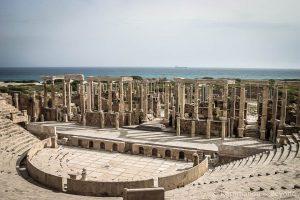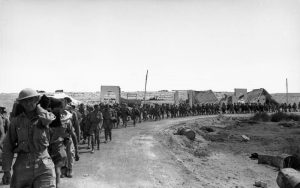This experience was to be a savage introduction to the world of the P.O.W., where it was every man for himself, and acts of comradeship and kindness were very rare.
By noon the next day several vehicles arrived and we were loaded aboard and formed a makeshift convoy heading westwards. Fortunately we stopped at a water point and were allowed to drink as much as we liked – although this was dangerous in our dehydrated state. Our miserable ride across the Libyan desert continued, and the next night we stopped in the ruins of Leptis Magna on the coast. We tried to make ourselves as comfortable as possible amongst the two thousand year old pillars and stones but it was bitterly cold, and I had reason to be eternally grateful to a Scottish Signalman who had managed to retain a greatcoat and who shared it with me.

Leptis Magna today – still ruined
Our seemingly endless journey through the desert continued, but as we were nearer the sea the daytime heat was not so intense. Many men were now sick with exhaustion, and tempers were on edge in the over-crowded trucks. Eventually we arrived at Tarhuna, which was not too far from Tripoli. The Italians – who were now our captors and guards – rushed us into a makeshift camp which consisted of a number of brick buildings and little else in the way of amenities. We were not given any blankets or even eating utensils, and it was a case of improvising as best one could. I was again grateful to my Scottish friend with the greatcoat, although we had to sleep on a hard floor. We were now all covered with body-lice, and spent hours each day trying to clean ourselves and the remains of our uniforms of these pests. There was no sick parade, and the only event of note was the daily arrival of the water-cart. Tarhuna was a hell-hole, and it was with great relief that after a month we were suddenly moved by truck to Tripoli. The camp here was tented and was little better than Tarhuna, but somehow the fact that we were nearer to the sea helped us to endure. A severe epidemic of dysentery broke out and perversely produced the one amusing moment of our stay in this dreadful place. A long line had formed at the medical tent, where pills were issued to combat the dysentery. None of us spoke Italian, but it was fairly obvious to the young doctor that we all had a similar problem. That is, except one Gunner of the 74th Field Regiment who was just in front of me in the queue. He was suffering from severe constipation, and his mime to the doctor in an effort to explain this would have won a music-hall standing ovation. How we envied him.

British prisoners taken after the fall of Tobruk. Dad could be in this picture.
After a few weeks of this horrendous existence we were taken to the dockside in Tripoli – a dangerous place to be as Allied bombers were frequent visitors – and after a wait of about twelve hours we were put in to the hold of a ship which sailed as soon as darkness fell. The hatches of the hold were battened down, and as there were about four hundred of us in the darkness below it was a case of survival above everything. When daylight came we were allowed on deck in small groups, and discovered that we were part of a convoy heading north across the Mediterranean. Our situation in the hold was indeed perilous as we would have had no chance if the convoy had been attacked by aircraft or submarines. We were given water but our situation worsened daily. After four days, however, the ship slowed to a halt and we heard the anchor chains being lowered. The hatches were removed, but we were not allowed on deck. Very soon we were astonished to see the faces of men, women and children from Taranto – where we had made port – looking down at us from above. We had become a peep- show. Many of the Italians shouted insults, and made threatening gestures which we returned with interest.
After some hours of being exhibited we were mustered on deck and proceeded to march through the town to a barracks on the outskirts. The march remains in my memory for one reason only. Crowds lined the streets, and for many of the Italian spectators it was not only a day of triumph but a family outing. Mothers held up their children to see the beaten enemy, and one child – probably about three years old – was eating a large bread bun. In a swift movement a Coldstream Guardsman in front of me seized the bread bun from the startled child and ate it without breaking step. In order to humiliate us further the Italians allowed young boys in Fascist Youth uniforms to march beside us as though they were our escorts. We were so pleased to be off the ship and comparatively safe that this gesture made no impact on us.
We arrived at a barracks on the outskirts of Taranto and were immediately lined up to have all hair shaved off from head and body. This was done quite expertly, and although we objected it was probably a good thing as it did mean we got rid of the lice. We were also allowed a shower, and were issued with overalls which for the first time for many months made us feel clean.
We were not to stay in Taranto for long. We were soon put on to a train with barred windows and doors, and with a sentry on the corridor outside each compartment. After many hours we arrived in Carpi outside Naples and were quickly transported to a prisoner-of-war canp. After a few days we were allowed to send a postcard home. I learned later from my mother that mine never arrived, and as the only communication she had received was from the War Office saying that I was “Missing, believed killed,” her misery continued. This was to end in quite a bizarre fashion. One of her neighbours was listening to the Vatican radio, where it was common for them to broadcast the names and numbers of P.O.Ws. in Italy. The neighbour was certain she had heard at least my name, but even in P.O.W. camps Joneses were not uncommon. However, it spurred my mother into visiting the Red Cross in Manchester where, after many enquiries, they were able to confirm that I was indeed a P.O.W. The family had quite a celebration, notwithstanding the fact that my situation was, to say the least, perilous.
It was at Carpi that we prisoners had our first phase of Red Cross parcels. Without doubt these items played a major part in keeping us alive throughout our P.O.W. life, and although the supply of parcels was irregular and the contents were often stolen during transit, we came to rely on them. The only dangerous effect they had was to enable ‘entrepreneurial’ types to start systems of barter and sale. In no time we had our rich, moderately well-off, and poor, as men cornered supplies of cigarettes, chocolate etc. As we had all started equal and had received equal treatment it does seem that certain forms of ‘socialism’ can never work!*
After a few months in Carpi we were moved for what we were told was to be our home for many years.’ Carpi was a transit camp, and as more prisoners were taken in Africa the pressure on space became overwhelming.
* This comment notwithstanding , Dad voted Labour all his life and while he tended to have a very negative view of charity, especially any charity associated with the armed forces, he always gave generously to the Red Cross.
|
|
|